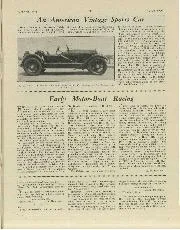
Sir,
Sir, I WW1 interested to read in the article on the 1923 J.C.C. "200" that the supercharged Fiats returned to Italy without the engine covers being lifted after they had…
Dietrich Mateschitz passed away without the Formula 1 world ever getting to know him, because his shunning of the limelight was so extreme. He did not do interviews, didn’t really mix with those outside his team, only attended the odd few races. Yet he will go down in history as one of the most influential and positive presences the sport has ever seen. Not only for his blockbusting F1 team but the sheer number of drivers his Red Bull development programme brought into the category over the years, not to mention the rebirth of the Austrian Grand Prix, something which would never have happened without his buying the old track near Zeltweg and his vision around it.
For the last decade-and-a-bit Red Bull the brand has had every bit as powerful an effect upon the sport as Marlboro had in decades past. All down to one visionary man who saw the sport he loved as the perfect fit with the image he wanted to project around his soft drink brand and the limitations to that vision of being a mere sponsor (as he was with Sauber).
That edgy, colourful, slightly rebellious, lairy image blew away F1’s previous black glass corporate sheen fostered by Ron Dennis-era McLaren. Fashions come and go and Red Bull has led the way in the last decade just as surely as McLaren did in the couple of decades before that; F1 took its cue from each.
“His vision was off the charts,” says former Red Bull star Mark Webber. “He had the ideas of 100 men. It was in everything he did. He had a bigger picture of what was possible way before anyone else. Anything he touched was like that. The way he operated was lean and agile, he’d brief people and then let them get on with it. He didn’t want any of it to be about him, didn’t want the light on him. But he was an amazing person to know. I wasn’t super-tight with him from the off, because I’d done my dealings with the Milton Keynes side of the operation and it was only when I broke my leg [on the eve of the 2009 season] that I saw what he was really about.
“He called the hospital in Tasmania and we had a long chat. He told me to stop worrying, that they would wait for me as long as it took for my recovery, told me that I was a big part of this and that it was going to be alright. It made me feel calm and that was a hell of a thing, as he would have been quite justified in making some difficult decisions that would not have been in my favour. Don’t forget, I’d not even won a race at that point. Not long after that there was a wet race in Malaysia and it was uncertain about whether we could race or not. We spoke on the phone then too and he said, ‘Look, it’s your decision. There’ll be no comeback on whatever you decide.’
“At Red Bull it was a simple structure, with everyone buying into that journey”
“He empowered people. Less was always more with him. He had a way of making you say yes. That smile, that big smile and the loyalty. You just felt you were with a really great guy. I think that goes right through the Red Bull team; it’s known as a place with a very high retention of people, with good stability. It’s a good employer.”
When Mateschitz bought the former Jaguar and former Minardi teams at the end of 2003 and re-branded them as Red Bull and Toro Rosso, even he with all his widescreen vision probably didn’t envisage the scale of future success.
“It would have been delusional,” says Webber, who joined the team in 2007, its third season. “We were all underachievers at that point. But with Helmut [Marko] there as the link between Salzburg and Milton Keynes it was slowly but surely built up and with Dietrich’s empowering of the key people – Christian [Horner] especially – it began to take shape.
“DC [David Coulthard] had been instrumental in bringing Adrian Newey on board and all the departments were made stronger. But it was a simple structure with everyone just buying into that journey.”
Young and vigorous and out to change the status quo, the team benefited from the big regulation change of 2009 which wiped away the accumulated advantage of Ferrari and McLaren. Red Bull was on its way, winning races and challenging for titles. In just the way Mateschitz liked – with the edginess borne of intense competition. “Dietrich helped me become a better athlete,” says Webber of his time there competing against team-mate Sebastian Vettel. “Just as he has done for lots of athletes in lots of different activities.”
Formula 1 owes a lot to Mateschitz, especially during the initial Covid crisis when it looked as if the entire F1 business model was at risk. “Who else had the balls to say, ‘Yes, we’ll have the first two races in 2020?’” posits Webber. “Liberty were new owners at that time and were green and among their concerns about numbers and thresholds of payments depending on how many races there were, Dietrich came along and said, ‘No problem. Let’s do it, let’s make it work. I’ll put on two.’ It was like that with all his solutions. No agendas, just pushing forwards, totally straight. He was an amazing man.”
Since he began covering grand prix racing in 2000, Mark Hughes has forged a reputation as the finest Formula 1 analyst of his generation
Follow Mark on Twitter @SportmphMark